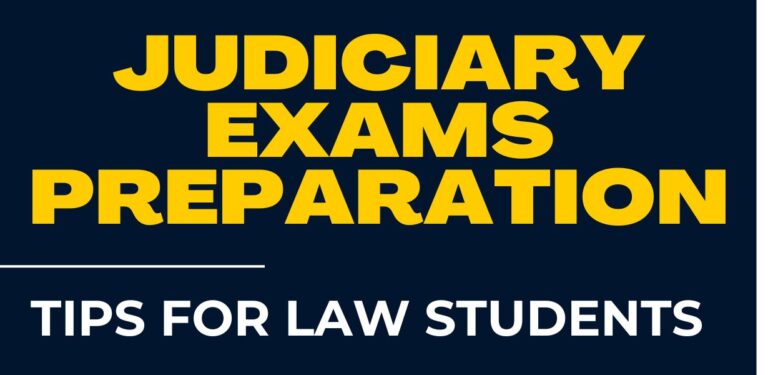How to Crack Delhi Judiciary Prelims Exam: Tips and Strategies

If you are planning to crack the Delhi Judiciary Prelims Exam, you need to be well-prepared and focused. The Delhi Judicial Services is one of the most prestigious services in the country, and cracking the exam is no easy feat. However, with the right strategy and approach, you can increase your chances of success.

The Delhi Judiciary Exam is conducted in three stages – Prelims, Mains, and Interview. The Prelims Exam is the first step towards your dream of becoming a judge. It consists of objective-type questions and tests your knowledge of the Indian legal system, current affairs, English language and general awareness.
To clear the Prelims Exam, you need to score above the cut-off marks, which are decided by the conducting authority. In this article, we will guide you on how to crack the Delhi Judiciary Prelims Exam and achieve your goal of becoming a judge.
Page Contents
- 1 Understanding the Delhi Judiciary Exam Structure
- 2 Eligibility and Application Process
- 3 Syllabus and Subject Breakdown
- 4 Work on Mains Exam First
- 5 Preparation Strategies
- 6 Focus on Right Study Material
- 7 Exam Taking Techniques
- 8 Analysis of Previous Year Papers
- 9 Sample Questions DJS Exam PYQ’s
- 10 After the Prelims: Preparing for Mains and Interview
- 11 Conclusion
Understanding the Delhi Judiciary Exam Structure

If you are planning to crack the Delhi Judiciary Prelims Exam, it is essential to understand the exam structure.
The Delhi Judiciary Exam consists of three stages, namely, Preliminary Examination, Mains Examination, and Interview.
Exam Pattern and Negative Marking
The Preliminary Examination is an objective type test consisting of multiple-choice questions.
It is important to note that there is negative marking in the Preliminary Examination. For every wrong answer, one-fourth of the marks (0.25) assigned to that question will be deducted. Therefore, it is crucial to attempt only those questions that you are confident about.
The Main Examination is a subjective test each carrying 200 marks. The papers are based on Civil Law I, Civil Law II, Criminal Law, and English. Each paper has a duration of three hours.
The Interview carries a weightage of 150 marks, and the final selection is based on the candidate’s performance in the Mains Examination and Interview.
Understanding the exam pattern and negative marking is crucial to crack the Delhi Judiciary Prelims Exam. It is essential to prepare well and attempt only those questions that you are confident about to avoid negative marking.
Eligibility and Application Process

Eligibility Criteria and Age Limit
To appear for the Delhi Judiciary Prelims Exam, you must meet certain eligibility criteria set by the Delhi High Court. The eligibility criteria include the following:
- You must be a citizen of India.
- You must hold a degree in law from a recognized university or institution.
- Your age must be between 21 and 32 years as on the date of the notification.
The age limit is relaxable for certain categories such as SC, ST, OBC, and PwD candidates as per the government norms. However, you must provide valid documents to support your claim for relaxation in age limit.
The notification for the Delhi Judiciary Prelims Exam is usually released in the month of January or February every year. You must keep a close eye on the official website of the Delhi High Court for the release of the notification.
Once the notification is released, you can apply for the exam online by visiting the official website of the Delhi High Court. The online application process is simple and straightforward. You must fill in all the required details in the application form and upload scanned copies of your photograph and signature.
It is important to note that you must pay the application fee while submitting the online application form. The application fee varies for different categories and can be paid online.
The schedule for the Delhi Judiciary Prelims Exam is usually announced along with the notification. You must keep a track of the important dates such as the last date for submission of application form, date of the exam, and date of release of admit card.
To crack the Delhi Judiciary Prelims Exam, you must ensure that you meet the eligibility criteria and apply for the exam in a timely manner.
Syllabus and Subject Breakdown
To crack the Delhi Judiciary Prelims Exam, you need to have a clear understanding of the syllabus and subject breakdown.
Law Subjects and Bare Acts
The Law subjects and Bare Acts section is designed to test your knowledge of various laws and their provisions. The topics covered in this section include the Indian Penal Code, Criminal Procedure Code, Civil Procedure Code, Evidence Act, Limitation Act, and Specific Relief Act, among others.
You must have a thorough understanding of these laws and their provisions to score well in this section. Make sure to read and understand the bare acts thoroughly. You can also refer to previous year question papers to get an idea of the type of questions asked in this section.
General Knowledge and Current Affairs
The General Knowledge and Current Affairs part is designed to test your knowledge of current events and general knowledge. This section covers topics such as history, geography, economics, science, and technology, among others.
Stay updated with the latest news and events by reading newspapers, magazines, and online news portals. You can also refer to books on general knowledge and current affairs to improve your knowledge in this section.
Language and English Proficiency
The Language and English Proficiency section of Paper is designed to test your proficiency in the English language. This section covers topics such as grammar, vocabulary, comprehension, and essay writing.
To improve your English proficiency, read English newspapers, novels, and magazines. You can also practice grammar exercises and vocabulary building exercises.
Make sure to write essays on various topics to improve your essay writing skills in Mains Exam.
By understanding the syllabus and subject breakdown, and preparing accordingly, you can crack the Delhi Judiciary Prelims Exam with ease.
Work on Mains Exam First
One of the most important things to keep in mind when preparing for the Delhi Judiciary Prelims Exam is to work on the mains exam first. This is because the mains exam is the most important part of the entire selection process, and if you don’t do well in this exam, you won’t be able to move forward to the next stage.
To prepare for the mains exam, you should start by familiarizing yourself with the syllabus and the exam pattern. Make sure you know what topics will be covered in the exam and what type of questions you can expect. You should also practice writing answers to previous year’s question papers to get a feel for the type of questions that are asked.
Another important aspect of preparing for the Mains Exam is to work on your time management skills. The mains exam is a lengthy exam, and you will need to be able to manage your time effectively in order to complete all the questions within the allotted time. Practice writing answers within a set time limit to improve your speed and accuracy.
Finally, it’s important to stay updated with the latest legal developments and current affairs. This will not only help you in the mains exam but also in the interview round. Keep yourself informed by reading newspapers, legal journals, and other relevant sources.
To crack the Delhi Judiciary Prelims Exam, it’s important to work on the mains exam first. Familiarize yourself with the syllabus and exam pattern, practice writing answers, work on your time management skills, and stay updated with the latest legal developments and current affairs.
Preparation Strategies
Preparing for the Delhi Judiciary Prelims Exam requires a well-planned study plan and effective time management skills. Here are some preparation strategies that can help you crack the exam:
Study Plan and Time Management
Create a study plan that is realistic and achievable. Allocate sufficient time for each subject and topic, and make sure to include regular breaks to avoid burnout. Set targets for yourself and track your progress regularly. Effective time management skills are crucial to succeed in this exam.
Command Bare Acts
Bare Acts are the fundamental sources of law and are essential for the Delhi Judiciary Prelims Exam. Make sure to read and understand the key sections of the relevant Bare Acts thoroughly. This will help you answer questions related to legal provisions accurately.
Work on Keywords
Keywords are the backbone of any legal answer. Make a list of important keywords for each subject and topic, and revise them regularly. This will help you frame your answers effectively and score better marks.
Recommended Textbooks and Notes
Refer to standard textbooks and notes recommended by experts and coaching institutes. This will help you cover the entire syllabus and understand the concepts in-depth. Make sure to take notes while studying and revise them regularly.
Utilizing Case Laws and Newspapers
Case laws and newspapers are an excellent source of current legal knowledge. Keep yourself updated with the latest legal developments by reading newspapers and case laws regularly. This will help you answer questions related to recent legal developments accurately.
Revision and Practice with Mock Tests
Revision is crucial to retain what you have learned. Make sure to revise your notes and textbooks regularly. Practice with mock tests and test series to assess your preparation level and identify your strengths and weaknesses.
Online Resources and Magazines
There are several online resources and legal magazines available that can help you prepare for the Delhi Judiciary Prelims Exam. Make use of these resources to enhance your knowledge and stay updated with the latest legal developments.
Coaching vs. Self-Study
Decide whether you want to opt for coaching or self-study based on your learning style and requirements. Coaching can provide you with structured guidance and personalized attention, while self-study can provide you with flexibility and independence.
By following these preparation strategies, you can improve your chances of cracking the Delhi Judiciary Prelims Exam.
Focus on Right Study Material
To crack Delhi Judiciary Prelims Exam, it is crucial to focus on the right study material. The right study material can make all the difference in your preparation and help you score well in the exam. Here are some tips to help you find the right study material:
Look for Reputed Publishers
When looking for study material, it is important to choose books and study material from reputed publishers. Reputed publishers are more likely to have accurate and reliable information. You can also check reviews and ratings of the study material to ensure its quality.
Choose Comprehensive Material
Make sure that the study material you choose is comprehensive and covers all the topics and concepts required for the exam. This will ensure that you to have a thorough understanding of the subject matter and are well-prepared for the exam.
Use Multiple Sources
Using multiple sources for study material can help you gain a deeper understanding of the subject matter. You can refer to textbooks, online resources, and study guides to get a well-rounded understanding of the concepts.
Practice with Mock Tests
Practicing with mock tests is an excellent way to test your knowledge and identify areas where you need to improve. Make sure to use mock tests from reliable sources and try to simulate exam conditions as closely as possible.
By focusing on the right study material, you can improve your chances of cracking the Delhi Judiciary Prelims Exam. Remember to choose comprehensive and reliable sources, use multiple sources, and practice with mock tests to ensure your success.
Exam Taking Techniques
Cracking the Delhi Judiciary Prelims Exam requires not only thorough exam preparation but also efficient exam-taking techniques. Here are some tips and tricks that can help you ace the exam.
Answering Multiple Choice Questions (MCQs)
The Delhi Judiciary Prelims Exam consists of objective-type questions, which means you will have to answer MCQs. To answer MCQs correctly, you need to have a good understanding of the subject matter and the ability to eliminate incorrect options. You can download studease application to have a good understanding of the exam test questions.
When answering an MCQ, read the question carefully and try to answer it before looking at the options. Then, read all the options and eliminate the ones that are obviously incorrect. This will increase your chances of selecting the correct answer.
Managing Time During the Exam
Managing your time during the Delhi Judiciary Prelims Exam is crucial. You only have a limited amount of time to answer all the questions, so you need to use your time wisely.
Start by allocating time for each section of the exam based on the number of questions and their difficulty level. This will help you stay on track and ensure that you have enough time to answer all the questions.
Tips and Tricks for Prelims Success
Here are some tips and tricks that can help you succeed in the Delhi Judiciary Prelims Exam:
- Practice previous year’s question papers to get an idea of the exam pattern and difficulty level.
- Improve your aptitude skills by solving puzzles, playing games, and practicing mental math.
- Use short notes, mnemonics, and diagrams to remember important information.
- Don’t waste time on difficult questions. Move on to the next question and come back to it later if you have time.
- Don’t panic if you don’t know the answer to a question. Use your knowledge and common sense to eliminate incorrect options and make an educated guess.
By following these exam taking techniques, you can increase your chances of cracking the Delhi Judiciary Prelims Exam.
Analysis of Previous Year Papers
One of the most important aspects of cracking the Delhi Judiciary Prelims Exam is analyzing previous year papers. By doing this, you can get an idea of the exam pattern, the type of questions asked, and the difficulty level of the exam.
To begin with, you should collect the previous year papers and start solving them. This will give you an idea of the time required to solve the paper and the level of accuracy you need to maintain. You should also try to solve the papers within the stipulated time to get a feel of the actual exam.
Next, you should analyze the papers to identify the topics that are frequently asked. This will help you prioritize your preparation and focus on the important topics. You can create a list of frequently asked topics and revise them thoroughly.
Another important aspect of analyzing previous year papers is identifying the type of questions asked. You should categorize the questions into different types such as factual, conceptual, and analytical. This will help you understand the nature of the questions and prepare accordingly.
You should also analyze the difficulty level of the exam. This will help you understand the level of preparation required to crack the exam. You can categorize the papers into easy, moderate, and difficult and prepare accordingly.
Analyzing previous year papers is an essential aspect of cracking the Delhi Judiciary Prelims Exam. By doing this, you can get an idea of the exam pattern, the type of questions asked, and the difficulty level of the exam. This will help you prioritize your preparation and focus on the important topics.
Sample Questions DJS Exam PYQ’s
To prepare for the Delhi Judiciary Prelims Exam, it is essential to practice the previous year’s question papers. Solving the PYQ’s will help you understand the exam pattern, difficulty level, and types of questions asked. Here are a few sample questions from the DJS Exam PYQ’s:
- The maximum number of members in the Legislative Assembly of Delhi is:
- A) 100
- B) 120
- C) 150
- D) 200
- Under which Article of the Constitution of India, the President is bound to seek the opinion of the Supreme Court of India on any question of law or fact of public importance?
- A) Article 143
- B) Article 132
- C) Article 124
- D) Article 126
- Which of the following is not a fundamental right?
- A) Right to Equality
- B) Right to Freedom of Religion
- C) Right to Property
- D) Right to Freedom of Speech and Expression
- The minimum age for becoming a member of the Legislative Assembly of Delhi is:
- A) 21 years
- B) 25 years
- C) 30 years
- D) 35 years
- The term of the Legislative Assembly of Delhi is:
- A) 4 years
- B) 5 years
- C) 6 years
- D) 7 years
Solving these questions will give you an idea of the level of preparation required for the Delhi Judiciary Prelims Exam. Make sure to practice more questions and revise regularly to ace the exam.
After the Prelims: Preparing for Mains and Interview
Congratulations on clearing the Delhi Judiciary Prelims Exam! Now it’s time to gear up for the next phase of the selection process, which includes the Mains Examination and Interview. Here are some tips to help you prepare for the upcoming challenges.
Detailed Mains Examination Syllabus
The Mains Exam is a descriptive paper that tests your knowledge of legal concepts and your ability to apply them to real-life scenarios.
To prepare for the Mains Exam, make sure you have a thorough understanding of the syllabus. Refer to standard textbooks, legal journals, and previous year question papers to get a clear idea of what to expect. Create a study plan and allocate sufficient time to each topic.
Practice writing answers to previous year questions to get a feel of the exam pattern.
Developing Analytical and Communication Skills
The Mains Exam and Interview both require excellent analytical and communication skills. To develop these skills, start reading legal articles and case studies. Analyze the facts and arguments presented in each case, and try to come up with your own opinions.
Practice writing legal opinions and arguments in a clear and concise manner. Use simple language and avoid jargon. Make sure your writing is well-structured and logical. You can also attend mock interview sessions to improve your communication skills.
Personality development for Interview
The Interview is the final stage of the selection process, and it is crucial to make a good impression. Your personality, confidence, and demeanor play a significant role in the interview. To prepare for the interview, work on your body language, communication skills, and overall personality.
Practice answering common interview questions and prepare your responses in advance. Dress professionally and arrive early for the interview. Make eye contact, maintain good posture, and be confident in your answers. Show enthusiasm and a positive attitude towards the job.
When you clear the Delhi Judiciary Prelims Exam, it is just the first step towards your goal. With the right preparation and mindset, you can ace the Mains Exam and Interview and secure your place in the judiciary.
Conclusion
In conclusion, cracking the Delhi Judiciary Prelims Exam requires a combination of hard work, dedication, and proper strategy. You need to have a clear understanding of the exam pattern, syllabus, and marking scheme. It is important to focus on your strengths and weaknesses and work on them accordingly.
Make sure to practice regularly and solve previous year question papers to get an idea of the type of questions asked in the exam.
During the exam, manage your time effectively and attempt the questions you are confident about first. Don’t waste too much time on a single question and move on if you get stuck.
Remember to stay calm and composed during the exam and believe in yourself. With the right preparation and mindset, you can definitely crack the Delhi Judiciary Prelims Exam and achieve your dream of becoming a judge. All the Best!







